 FCC has finally posted the documents related to the Treo 300's approval
process - and we got more than we bargained for.
FCC has finally posted the documents related to the Treo 300's approval
process - and we got more than we bargained for.
In addition to the standard test results and the product manual, FCC
posted a 28 page hardware specification of the Treo 300. The internal
Handspring document, which is labeled as Handspring Confidential Proprietary,
defines "the electrical hardware for the London communicator product
define[es]
what hardware is provided, how it functions, and how software should control
it."
Among other things the document reveals that the screen uses 12-bit STN 162x162
pixel technology, identical to the screen in the Treo 270 and Treo 90. Also like
the 270, the keyboard contains a backlight for low light and night time use. The
PalmOS will reside in MROM, which is not flashable. The unit ships with 16MB of
SDRAM, but can support up to a 32 MB. Curtiscarmack from our discussion
board thinks there might be room for some potential aftermarket memory upgrades.
The detailed Sprint branded manual reveals the new features of the Treo 300.
The Dialer program is slightly modified, and contains several changes:
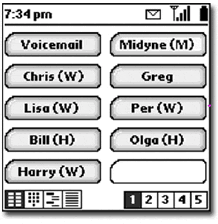
- The current time is displayed in the status bar (rather than the
provider's name).
- The voicemail icon is an envelope, and is right justified on the
screen. The Dial Pad view's number 1 key also contains the same icon.
- The active call screen contains a Mute Microphone button. We can't
tell from the manual if you can turn the speaker phone on before the calling
party answers.
- Several new ringtones options are available. Set different tones for Known
Caller, Unknown Caller, Roaming Tone, Message Tone, Voicemail Tone, and
Service Tone. There is also support for unique ringtones for individuals
listed in the Speed Dial (does not seem to work with the rest of the Address
Book, unlike TC Ringer).
The SMS program has received some nice updates as well. While viewing an SMS
message, you can highlight either a phone number, an e-mail, or a URL. A new
"Action" button changes to Call, Email, and Browse respectively. According to
the manual, the user needs to subscribe to the Sprint PCS 3G network services to
use SMS.
The manual also confirms that the 3G data services are billed according to the
amount of data (kilobytes) you send and receive, not the minutes you use on your
phone.
No availability date or pricing is yet available.
Photos of the Treo 300 (Internal and External) are now available. We've chosen
six to show here.

Here is the front of the Treo 300 - notice that the Handspring logo has moved to the upper left corner, with the Sprint logo featured on the flip.
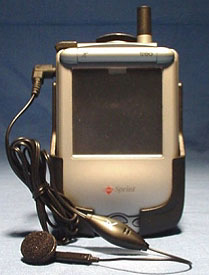
Another picture of front, this time while the Treo 300 is in the holster.
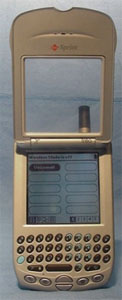
The Treo 300 with its flip open. Again notice the Sprint logo.
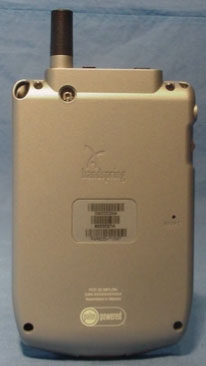
The back of the Treo 300. Sadly without a SIM slot, all barcodes and other information must
now be put on the back. Also notice that at the top, where the power button, sound switch, and antenna are, the base of that has been raised. This appears to be the only structural difference between the GSM Treo's and the Treo 300.
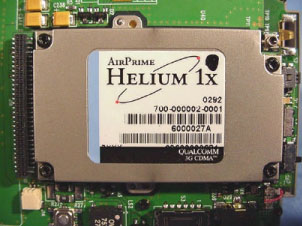
An internal picture of the AirPrime CDMA module.
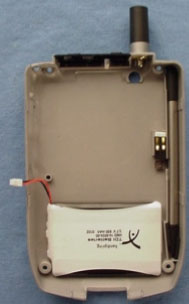
An internal picture of the Treo 300's battery, and inside of the case.
More photos are available in the pdf's off the FCC website.
Thanks to Marty1781 and
RLewis for the links.